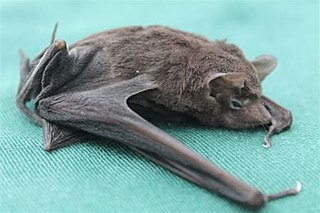
The Seychelles fruit bat or Seychelles flying fox is a megabat found on the granitic islands of Seychelles, and on the Comoros and Mafia Island. It is a significant component of the ecosystems for the islands, dispersing the seeds of many tree species. Although it is hunted for meat on some islands, it remains abundant. It is particularly common on Silhouette Island.

The Seychelles skink also known as the Mangouya, is a species of skink in the family Scincidae. It is endemic to the Seychelles.

The Seychelles bronze gecko is a species of lizard in the family Gekkonidae endemic to Seychelles.

The Seychelles sheath-tailed bat is a sac-winged bat found in the central granitic islands of the Seychelles. They are nocturnal insectivores that roost communally in caves. The species was previously abundant across much of the archipelago, but has since seen a substantial loss of habitat. The International Union for Conservation of Nature has listed the species as being critically endangered, due to population decline. This is mainly due to an increase in land development and the introduction of invasive species.
Seychellia is a genus of long-legged cave spiders that was first described by Michael I. Saaristo in 1978.

Anapistula is a genus of dwarf orb-weavers that was first described by Carl Eduard Adolph Gerstaecker in 1941.
Andasta is a genus of ray spiders that was first described by Eugène Louis Simon in 1895.
Andasta siltte is a species of ray spider that is endemic to the Seychelles. It is only known from a single specimen from Silhouette Island. It is found in woodlands at the lower edge of cloud forest. It is threatened by habitat deterioration, from invasive plants and climate change.
Argyrodella is a monotypic genus of Seychelloise comb-footed spiders containing the single species, Argyrodella pusillus. It was first described by Michael I. Saaristo in 2006, and is found on the Seychelles.
Zoma zoma is a species of ray spider that is endemic to Silhouette Island of Seychelles. It was first described by Michael I. Saaristo & A. V. Tanasevitch in 1996. To date Zoma only contains its type species Zoma Zoma. The name of Zoma refers to the belt of silvery corpuscles on the abdomen of the type species. Not much is known about males of the species. Females have a total length, not including chelicerae, of 1.79 mm. It is threatened by habitat degradation from invasive plants, such as Cinnamomum verum.
Pleorotus was a monotypic genus of Seychelloise huntsman spiders containing the single species, Pleorotus braueri. It was first described by Eugène Louis Simon in 1898, and was endemic to the Seychelles. The description was based on a single male collected on Mahe Island in 1894, but none have been found in later collections, and it has been declared extinct.
Zoma is a genus of ray spiders that was first described by Michael I. Saaristo in 1996. As of June 2020 it contains three species, found in Japan, China, and on the Seychelles: Z. dibaiyin, Z. fascia, and Z. zoma.
Sesato is a monotypic genus of African comb-footed spiders containing the single species, Sesato setosa. It was first described by Michael I. Saaristo in 2006, and is found on the Seychelles.

Seycellesa is a genus of spiders in the family Theridiidae. It consists of only its type species: Seycellesa braueri, which is endangered and endemic to the Seychelles.
Spinembolia is a monotypic genus of African comb-footed spiders containing the single species, Spinembolia clabnum. It was first described by Michael I. Saaristo in 2006, and is found on the Seychelles.
Stoda is a monotypic genus of African comb-footed spiders containing the single species, Stoda libudum. It was first described by Michael I. Saaristo in 2006, and is found on the Seychelles.
Michael I. Saaristo was a Finnish arachnologist, with a particular interest in the spiders of the Seychelles. The World Spider Catalog lists 61 genus names or synonyms and 109 species names or synonyms of which he is the sole or co-author.
Euso muehlenbergi is a species of spiders in the family Ochyroceratidae. It was first described in 1998 by Michael Saaristo. As of 2021, it is the only species in the genus Euso, erected by Michael Saaristo in 2001. It is found in the Seychelles.
Roche roche is a species of spiders in the family Ochyroceratidae. It was first described in 1998 by Michael Saaristo. As of 2021, it is the only species in the genus Roche. It is found in the Seychelles.

Antisolabis seychellensis is a rare species of insect in the family Carciniphoridae, endemic to Mahé, the main island of the Seychelles. It is considered critically endangered. Antisolabis seychellensis is found only in the area called Morne Blanc on the island of Mahé and its restricted habitat is disturbed by invasive plant species such as Ceylon Cinnamon and Jamrosat.







